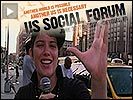
Topics
Guests
- Stacey Milberndisability justice activist.
- Leah Lakshmi Piepzna-Samarasinhadisability justice activist.
Disability justice activists gathered in Detroit to take part in the US Social Forum and the Allied Media Conference. “There is a growing framework about how disability connects with other issues,” says Stacey Milbern. “It’s a way to maintain ablism and not look at the way disability connects in with how our bodies are policed or experience trauma in the medical-industrial complex.” [includes rush transcript]
Transcript
AMY GOODMAN:
At the opening march of the US Social Forum here in Detroit, disability rights activists paid tribute to Justin Dart, a longtime advocate for the disabled. Dart died in 2002 and has been credited with helping to pass the American with Disabilities Act. Marchers made a giant puppet of Dart sitting in his wheelchair.
Earlier in the week, Sharif Abdel Kouddous met up with two disability justice activists.
STACEY MILBERN: I’m Stacey Milbern. I’m with the National Youth Leadership Network.
LEAH LAKSHMI PIEPZNA-SAMARASINHA: And I’m Leah Lakshmi Piepzna-Samarasinha, and I’m a performance artist. I do some work with Sins Invalid.
SHARIF ABDEL KOUDDOUS: And what’s this gathering here today?
STACEY MILBERN: Sure, this is a disability justice convening. A bunch of us have been at the Allied Media Conference, and there’s been kind of just this growing space for disability and disabled people. And there’s this kind of growing framework about looking at the ways disability connects with other issues. So often times disability gets separated, and it’s a way to really like maintain ablism and not look at the way that disability connects in with, like, how our bodies are policed or how our bodies experience trauma in the medical-industrial complex, or even just like how our bodies, yeah, are kind of forced to fit the standard of what beauty is or what independence is.
LEAH LAKSHMI PIEPZNA-SAMARASINHA: Yeah. And so, the way I’ve been trying to describe it is that I think that I feel like disability justice is the mainstream disability rights movement. It’s similar to the difference between environmental — the environmental justice movement and the mainstream environmental movement. What a lot of us in disability justice are working against is a mainstream movement that’s very white, very straight, very middle class. We are led by people of color, by queer people of color, and we have analysis that goes beyond access to looking at the effects of environmental racism on disability, or poverty or the medical-industrial complex. And also, just echoing what Stacey said, a lot of us feel that, as people who do social — many kinds of social justice work, often people with disabilities, you know, we get to kind of be the cute people who march at the beginning, who roll at the beginning of the march, who people feel heart-warmed by, but we’re not seen as leaders or as part of the movement. And we want to change that.
SHARIF ABDEL KOUDDOUS: And what does disability justice mean to you?
STACEY MILBERN: To me, I think what’s been most amazing about it is, like, disability justice has been just a space to kind of be whole. Like, you don’t have to cut yourself up into little pieces and go here, go there. And also, just like being able to connect with folks in like this really interdependent way, where everybody is really taking care of each other and, yeah, just kind of creating community or developing relationships, where people are actually, like, practicing liberation.
SHARIF ABDEL KOUDDOUS: And what are some of the specific things that you’re calling for?
LEAH LAKSHMI PIEPZNA-SAMARASINHA: I think it’s really important that we build movements that are sustainable. And I think that’s one of the things that disabled people are really fierce and know a lot about. Speaking as a chronically ill, queer, disabled — queer woman of color, I’ve been working in the movement since I was sixteen, and there’s a way of organizing that assumes that everybody can make it to sixteen meetings a week and live on coffee. And for a lot of us, whether we’re disabled, whether we’re parents, whether we’re old, that’s not an option, and it stops us from making movements that don’t burn out and that actually are going to be around to transform society. So I think making sustainable and interdependent movements in the new world we’re building is what DJ is all about.
STACEY MILBERN: Yeah, actually, can I add on to that? I think, too, disability justice has just been — I don’t know, like when we think about — there’s like a really limited idea of access and accessibility. And when we’re really, really able to stretch it out to, like, what do people need to be who they are, it becomes like creating a world where everybody can really participate — mothers, we’ve seen that work out well, and, yeah, working-class folks, everybody. And disability kind of really pushes that forward.
AMY GOODMAN: We’ll be broadcasting from US Social Forum tomorrow, then on to Toronto. I’ll be speaking in Toronto on Saturday night.











Media Options